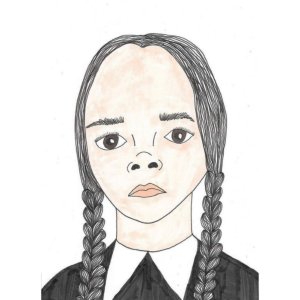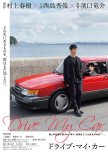
Their mouths were filled with words, but their souls were clothed with the unsaid.
The very first week of February, I have realized that I have always desired to live between the borders of the city and the countryside. I both want the busyness of the city and the passive greenery of the countryside; just like how I always found Iceland fascinating with its crisp weather spring and cold, wrathful volcanoes and glaciers.As I watched Drive My Car, it seemed like I was able to dwell between such paradoxical parallels. I, myself, was in that red Saab 900 having a trip around all my own melancholia, detachment, joy, death, transformation, grace, and, perhaps, hoping that my final destination would be life, itself.
We, the audience, are actually the red Saab 900. As the car took its ride everywhere, it saw the sunny cities only to be blocked by hard, metal and concrete buildings. It hears of the city's sweet promises of opportunities, only to be disturbed by the rushing expressways. Then, it goes a little further from the city only to witness that the natured trees and floras were cold with thick snows. This was also how we perceive the characters in the film: there was beauty and brokenness within them.
Anton Chekhov's Uncle Vanya was featured in the film in which the main protagonist was working to direct an adaptation of the play using multiple languages: Filipino, Mandarin, Japanese, Korean, Malay, and even sign language. In spite of its multilingual feature, there is a certain silence or repression imprisoning the film. Their mouths were filled with words, but their souls are clothed with the unsaid.
The silence embracing the film, though, was greatly rich. There were some parts that I was close to shedding a tear even though there were no exaggeratedly loud neither emotively suggestive background music and acting performances. It was not emotionally manipulative and it truly was its genuine intentions and authenticity that moved me.
Drive My Car truly moved me that I didn't even realize that it could be slow. That slowness, though, was very purposive. For that's how it is to go through grief and to wait for life. It can be slow, as if you are being sucked out of life and light. How could you expect a film about grief and healing to move so fast and quick?
Towards the epilogue, Misaki was seen buying her groceries and driving the red Saab 900 with her new friend, a dog (which made me squirm a little for how adorable it was). At that moment, I understood that life is not the final destination. Life, itself, is the journey. For life does not stop, but it keeps going on. The dead has reached their destination already, but, we, the living, must keep going on with the journey. Keep driving your car, humans.
†† † † † ‡
"What can we do? We must live our lives. Yes, we shall live, Uncle Vanya.
We shall live through the long procession of days before us, and through the long evenings; we shall patiently bear the trials that fate imposes on us; we shall work for others without rest, both now and when we are old;
and when our last hour comes we shall meet it humbly, and there, beyond the grave, we shall say that we have suffered and wept, that our life was bitter, and God will have pity on us.
Ah, then dear, dear Uncle, you and I shall see that bright and beautiful life; we shall rejoice and look back upon our sorrow here; a tender smile -- and -- we shall rest.
I have faith, Uncle, fervent, passionate faith."
Was this review helpful to you?
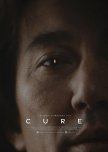
This review may contain spoilers
C U R EC—URE
C—YOU'RE
SEE, YOU'RE
SEE, YOU ARE...
"Who are you? Tell me about yourself."
Kiyoshi Kurosawa's Cure is first, a procedural crime thriller, but foremost, a philosophical and psychological rumination of the societal condition. It is more arthouse and atmospheric than the usual sort of procedural thriller in mainstream cinema. It does not serve a complete and absolute answer. Rather, it gives you questions and clues which lets you think and connect the puzzle, yourself.
In the film, we comprehend that the killer perceives the detective as someone who is not cured.
"The detective or the husband? Which is the real you? Neither one is the real you. There is no real you."
The detective is filled with frustration due to his societal responsibilities. This is his prison since his choices are bounded by societal expectations and not because it completely reflects his own authentic decisions. This prison is what created and worsened the disease in his humanity. He cannot be his real self. He is not cured.
"You’ll be born again, just like me."
Perhaps, the killer wants to free the people from society by letting them truly know and express their profound fears and desires. This is how he will cure them and just like that, they will all be reborn.
It might be true that knowledge is power and to completely know ourselves can be the utmost cure to the disease of humanity and society. Though, does letting our desires and fears own us creates the perfectly authentic self? Or are we just letting ourselves be a slave to them?
In the end, the detective has become the "cured", himself. He didn't repress his fears and desires anymore, but he has become mesmerized by them. Indeed, they have become himself, completely dictating his decisions which also led him to dictate others.
Ironically, the detective has become the society that imprisoned and frustrated him for so long; thinking about what solely makes sense to him and imposing it to others believing that it's the true and ultimate way to be freed and cured.
Just like the long-time, lingering question whether hypnosis is a true science or a pseudoscience: is it really a means to cure or control? Is the detective cured or controlled? Is he curing them or controlling them?
Was this review helpful to you?
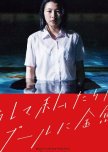
They cannot see, but they can swim.
The daily quest for something greater than yesterday; seeking and creating an inane comedy in order to swim against the drowning tragedy. A hyper-stylized reality and hyper-realistic fiction of dreading the future, vexing nowhere hometowns, run-of-the-mill every day, and imperiled communality.They trust no one but they feel betrayed by those who have left them to be miserable on their own. They hate the doomed feeling and even hate more those who still cling to hope. They cannot see, but they can swim. Will they have to stay here forever and be eternally visionless or will they have the courage to leave this nowhere doom? For one day, putting goldfishes in the pool will not be enough comedy anymore to wash away the tragedy of the ordinary.
Was this review helpful to you?
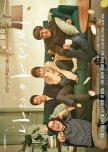
I am in awe with how all the characters were created or personified; they were not flat and most importantly their personas and imperfections were not romanticized. They were all just outright human beings with interesting, but realistic back stories. Though, with the exception of Ji An's techie gamer friend, I wish that there was more background regarding his life.
Furthermore, what made this series even greater was that it's not meant to be emotionally happy neither unfortunately tragic (or perhaps that's just how I comprehended it). There was no sense of longing or nostalgia (I, personally, dislike regression, myself). This series was made for healing and closure and to remind all of us that there is nothing too tough for us, in our past nor in our present, to build a new beginning and a greater future. Everyone, let's keep moving forward.
Was this review helpful to you?
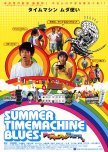
This was truly a light and uncomplicated take regarding the time travel theme. In spite of its absurdist comedy performed by its stupidly quirky characters, it turned out to be more clever. Without it being too straightforwardly philosophical, the subtlety of its dialogue suggested otherwise.
"Isn't it more logical to think everything's decided from the start?"
"Can one change their name?"
There's the philosophical, theological, and scientific musing going between these two conclusions from two different characters: Predestination vs. Free Will. Personally, I think that both concepts are two sides of the same coin. Both are true, co-existing, and complementary of each other. Just as how we are both made of objective truths and subjective ideas. So, keep laughing at the absurdity of it all and mourning the mundane. As time is an unstoppable force that always comes and goes, yet, there is summer that can also be an enforceable idea and a state of mind.
______________________________
S U M M E R
a bleary breeze blew
in the town of indie bliss
where nights disappeared
T I M E
you were born to kill
and also to die daily
yet, alive always
M A C H I N E
in copper and gold
of sweats, and tears, and of blood
the crude have no soul
B L U E S
tender angel hues
melancholic violets
serene violence
Was this review helpful to you?
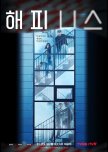
I appreciate how this drama gave off a raw, natural, and cozy sanctuary despite the somewhat horrific subject matter. It is obvious that the drama was not made with a very high budget. There were no uses of CGIs neither extremely exaggerated editing. I really like to commend the make-up department here for doing such a good job. The action choreography was also deserving of credits.
Even the romance and drama here were not overly exaggerated. The romance was more subtle, mature, and responsible rather than being too fluffy and cheesy, which was reasonable considering the subject matter and context of the situation they are in. Unlike most KDramas also where it becomes more melodramatic and makjang during the later episodes, this stayed true to its perfect balance of thriller, suspense, and drama.
The Seyang Forest Apartments symbolizes or represents happiness. The poster alone shows that this apartment is central to the setting and overall plot of Happiness. From the very first episode, we can already see that Sae-bom has always been looking forward to having her own apartment. For her, this would be her ultimate happiness because she wanted to change the ugly memories of her chaotic home with a much better and peaceful one. During the lockdown and pandemic, we can see the hindrances to one’s happiness in this apartment. There are the class disparities (numerous floors and ladders going up and down), egoistic and selfish nature motivated by one’s survival (different rooms in the apartment), external factors such as the pandemic, itself (being locked inside the apartment). Due to these, Sae-bom was even threatened to be kicked out of their apartment—her happiness. But, just like what a natural human instinct to do, she disagreed and fought for her happiness.
The last episode’s title was Happiness Is With You. Indeed, it wasn’t the house, itself, or the fact that one can have a shelter to sleep on that makes a happy home. It was evident on what happened to the Seyang Apartments. Happiness is in the communal spirit; the collective motivation to do and grow better together. If only most were able to put down their pride and prejudice, the apartment wouldn’t have turned so chaotic.
I would have given this show a perfect score if not for the last two episodes. The ending also seemed rushed to me. The message of the apartment and happiness were given more focus that the other details outside the apartment were overlooked. I wanted more elaboration regarding the causes of the disease or whether the pill was really the beginning of it all. There was also no explanation or just a more subtle clue about what happened to the corrupt and higher officials. In addition, the martial law part bothered me a bit. For some, it may come off as a propaganda or perhaps, it just shows a lot about the reality of how most of our government reacts during these kinds of situations which was really lacking and unhelpful.
Was this review helpful to you?
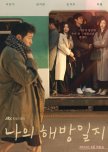
If you keep leaving will you continue living?
You never hated your hometown, but you also never had any special attachment to it. You've always wanted to be somewhere else. You wanted to leave. There's this suffocating feeling with the realization that you will keep growing or existing in the same place where you were born. It's like being seventeen and still wearing the same shoes you were wearing when you were seven.If you keep leaving will you continue living? As if the only way you can keep surviving is if you keep changing. You kept changing, but you never evolved. The desire for leaving turned into a fascination for death. Suddenly, from being an innocent child drowning in ambitions and hope, you're an angsty, jaded pubescent. You changed your mind a million times each day. You were convinced you stopped growing a long time ago and you're just growing old now. Foolish. You were not precocious, you were just mentally ill.
You were young and your brutal, or perhaps innocent, honesty never concerned itself with the consequences. You grew a little older and you suddenly don't want to talk anymore. You buried your honesty to die. Silent, passive, and stuttering. You felt everything and you felt nothing. Your thoughts ran rapidly, but they never made sense.
Helpless. Incapable. The days are dull and unchanging. You wanted to be liberated from all of these. You wanted death, but you also envy the future. The darkness was exhausting, but it was obscurity that gave you home. Then, it occurred to you once again. You don't need a home. You were not supposed to be attached to places. You have to keep leaving in order to continue living. You realized that you might not have a strong attachment with your hometown, but it is a place that will always bring you comfort. Indeed, it is a comfortable home, but you also have to grow, discover, and learn.
Time has passed. You are uncertain how long has it been, but you are certain how much you wanted to live now. Death is only a reality to you now, not a desire nor a fascination. You no longer envy the future, but you hope and strive for it. The childhood that you have forgotten, you don't try to recall it anymore, but you are living it. Just like the innocent assertiveness of a child, you are convinced that you are capable of being everything. You laugh more these days. You have joy and immeasurable dreams. You have faith in spite of all the uncertainties.
Are you liberated? Perhaps, not completely. Perhaps, you are just Mr. Gu, who has decided today to throw away his bottle of liquor instead of drinking it; who has given himself and others the chance to receive mercy instead of constant rough punishment. You might just be Mi-jeong who has chosen grace instead of hostility, who has finally understood now her own capability. You are Gi-jeong who has more love now than judgement; she never hid her honesty, but she speaks more of life now than mere brutality.
Or you are just Chang-hee. He was not able to acquire the riches and power he wanted, but he was enriched with the wisdom of life. He did not have to climb a thousand won mountain, the mountain he was searching for was inside him already. It was somewhat ridiculous that his life was continuously fulfilled by the deaths that he encountered. Through the leaving of others, he lived a meaningful epiphany.
Trudging on step-by-step; five seconds, seven seconds, until at least, five minutes of joy each day. Liberation is not solely a one process. Though, surely, we will entirely grasp it one day.
Was this review helpful to you?
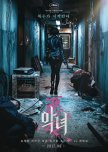
Though, I have certain doubts regarding the whole story line. I think my problem sometimes with most Korean shows is that even when they're doing thrillers, they almost always have a tendency to become melodramatic. Even the plot twists in this supposedly action film seemed more like a melodrama sensationalism found mostly on makjang dramas—a genre that I just don't seem to enjoy nor appreciate greatly. I am also not a very big fan (especially nowadays) with the "vulnerable past" as a vehicle for most action films. Sometimes, it's just nice to have an action protagonist/s chasing life and death because of a current or future goal.
Still, it was not a wasted experience to have witnessed Kim Seo-hyung, Shin Ha-Kyun, and most especially Kim Ok-vin's exceptional performance. She truly gave an adept and convincing portrayal of being both vulnerable and invincible. She truly was the villainess.
Was this review helpful to you?
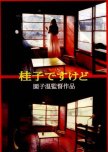
I think this is the very allure of slow and ambient films for me. Some might consider such as boring, but I think it's rather empathetic, understanding, and thoughtful; to have the filmmaker not only give you the questions, then, also give you absolute answers or options after. Rather, they give you only questions and time to have yourself ponder with the character and perhaps figure out the answer on your own.
"I am dying for my life."
22:22
I am Danforens. I am Danij. I am Dani.
She is Keiko. She turned 22.
I, too, will be 22 this November.
1, 2, 3, 4, 5, 6, 7...17...60.
Keiko is one minute older.
She kept counting.
I, too, likes to count in my head
for no apparent reason.
She waited for her birthday.
She hoped to be reborn after.
I don't wait for my birthday.
I can start again today.
Though, I am not certain how to.
22:29
We have lived for 7 minutes more.
And 7 minutes closer to death.
Each passing moment,
we are dying for living.
"I am dying for my life."
Was this review helpful to you?

A simple, but delightful drama which was akin to spring transitioning to summer...
I hesitated at first to watch this drama. I've seen Shin Se Kyung's past dramas and I was not convinced with her acting then. In addition, there are three distinct genres that do not easily catch my attention: sports, musical, makjang, and war or period shows. Run On happened to be about sports. Still, I followed my instincts and tried to watch the first episode and to my delight, I was not disappointed at all. I think assertive characters fit Shin Se Kyung more as her acting was convincing this time.Run On seemed more of an ambient film. It was not particularly plotless, but it was not really centered on its plot. It rather more focused on its characters—their behaviours, growth, and how they perfectly contrasted each other.
Run On still relied in some known clichés, though, it was brilliant enough to craft its own refreshing twists as it was rather progressive than just blindly confining to the conventions of such known clichés. It was great that it also gave way in empowering women.
I also appreciated how they portrayed each character with realistic flaws without overdramatically romanticizing them: the rational and independent, but condescending and insensitive Dan-ah; the creative and adorable, but childish Yeong-hwa; the ethical and hardworking, but socially awkward Seon-gyeom; Mi-joo, who was also independent and hardworking, but sometimes tactless. Even the supporting characters did not disappoint with the interesting character study. I also appreciated how the drama tackled the fondness for cinema; Mi-joo worked as an English subtitle translator and the name Yeong-hwa also means "film".
This was overall a simple, but delightful drama. This was akin to spring transitioning to summer. It was just a relaxing show to sit on as you relish in the four season tropical punches brought by each character's quirks and flaws.
Was this review helpful to you?
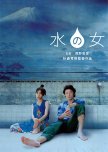
blue is what freedom to the seekers
as green is hallowing to the thinkers
where water do not wither the burning
and fire do not fallow the consecration
restless and tranquil
𓇢𓆸𓇢𓆸𓇢𓆸
"Trees are great. All they do is drink water. "🌳✳️
Was this review helpful to you?
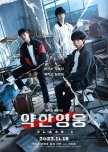
"You guys are so predictable. Does this fill your ego?"
(+)To sum up this series: this is the ancient tale of the fragility of youth and/or the toxicity of macho masculinity. Wherein the only emotions that most males could muster here is their ego-filled aggression, anger, and greed.
(-)
School bullying and male aggression have been, as prior mentioned, an ancient tale. As if a vampire that continues to age, but never dies—these issues are almost, if not always, part of most KDramas and even those from other countries. Though, an ancient thing does not always mean a cliche thing, especially such matters that are as rampant and relevant as these mentioned subjects.
What made this series rather different was its straightforwardness right from the start. It was gripping to watch from start to finish as there were no unnecessary fillers neither irrelevant tropes. Although I enjoy a little romance at times, I was glad that it was rather focused on its very themes of youth, friendship, and violence instead of distracting the audience with side stories of romance as what most KDramas love to do.
It was satisfying to watch a main protagonist that is so serious about their studies and being a responsible student all while still not being a pushover and also not refusing to back down to bullies. It can be really exhausting to see this trope of a nerdy intellectual student who is always portrayed as weak or a pushover. Thus, it was really satiating to see the main protagonist apply their interests in maths, psychology, physics, etc. as a strategy in their physical fights in spite of not being absolutely gifted in physical strength.
(x)
The series is truly a heart-wrenching violence multiplied. Yet, it was also a sundry of heart-warming spectacles. Dark and horrific, but the humanity here was not blind.
(÷)
As much as I really liked this series, I still have some divisive opinions. I instantly appreciated the way they started this with the main protagonist applying maths, physics, and psychology in his physical fights. Though, towards the end, such premise deteriorated and was not properly utilized. I understood that towards the climax, the emotions of the main protagonist were totally heightened and desperate for revenge. Though, the revenge could have been much more intriguing and also consistent with the way they introduced his character if they utilized more such wit and strategic thinking.
(=)
Overall, I still can say that this series was absolutely outstanding, especially, in terms of acting performance, pacing, direction, and musical composition. I was really impressed with Si-Eun (Ji Hoon)'s performance here, especially that intense eye acting. Yes, I really love it when a thespian do know how to act greatly with their eyes.
The OST and the direction and choreography of the action scenes were also marvelous. The writing was also excellent, though I believe that there was still more necessary exertion to do. Though, I really despise this old tale of violence being a never-ending cycle. Thus, I am looking forward to its final end in the upcoming second season.
Was this review helpful to you?
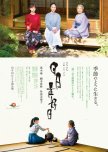
I do appreciate it when a film does not rely on emotional manipulation techniques to transmit a heartfelt stimulation. The emotions provoked are more genuine and authentic, rather than forced and assaulting. I do despise it when a film forces a melodrama only for the sake of breaking a heart, without having your soul or innermost being be moved.
This film is like the former for me. It didn't break neither moved my heart, but it really spoke to me: quiet, delicate, but so profound. This was a walking still life: food, nature, almost rugged, yet, so mellow. You might shed a tear or two not because you felt emotional nor understood, but because you can somehow learn a simple thing about life. It is not about being understood, but acquiring some understanding that evokes the greatest humanity inside of us.
Instead of the film displaying a hyperbole of feelings, the rhythm of rain weighed heavier as it climaxed. The wraiths of wisdom wrung by the waterfall—don't read the characters (letters); see them as pictures. The rottenness and fruitfulness of her romances were portrayed rather vaguely. We have never seen the facade of her lovers neither the redness of a relationship, but we have witnessed the unaffected train leaving her in her sombre solitude; the heat of the sun callously flooding her room in the depth of her depression; and the warmth of the sun finally embracing the entirety of her cheek as she walked with her newfound love.
Science says that water possesses negative ions that enhance mental and emotional health. Even spiritual notions hold water as a vital healing matter. As such, we could see from the film how water affected the characters, especially Noriko. She always found herself in the sea, the river stream, or even drinking from a sōzu (water fountain) during the toughest times of her life. As if the flowing waters spoke for her when she could not find the words or exact expression to expound what she thinks or feels.
The epilogue scene was New Year's day. In spite of the numerous times that the winter season was shown or talked about in the film, this is the only time that falling and covered snow was in sight. There was only rain and sunshine before, but now she has snow. As the new year changed, the old seasons withered away and Noriko has changed as well, except for one thing, she still goes to Tea every Saturday.
Noriko was portrayed to be slow and almost overly analytical. Perhaps, inside her mind was where her real world was. Though, learning about tea has changed her as a person; and now each time she could not find life, going to the teahouse gave her renewal and refreshment.
"By teaching, you are taught."
"Perhaps, my real beginning comes now."
Was this review helpful to you?
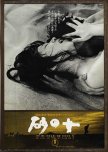
Stockholm syndrome, internalized oppression, capitalist prison, and quarantines. They were constrained to dwell in a constant lockdown wherein their forced labor was their only choice of survival. Yet, as he was about to return to his fat cat city and material job, he was clinging onto the suffocating sands.
In a world where choking is the only relief for drowning, perhaps, freedom is only a spectre, a spirit, a state of mind.
He went up to see the sea. He went down to check the water mysteriously pumped by the damp sand. A child looked down on him. He looked up to the child. She might bear a child. He might bear an invention, a discovery. She was in pain; he was ignited with enthusiasm. The storm frightened her: all its raging winds and waters, killed her husband and child. He held no fear, but hope in the water which might sustain the future of his child.
Only the sands could tell the events of the man for seven years. Though, certainly, the woman in the dunes was there to stay forever.
Was this review helpful to you?
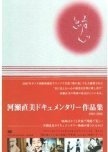
Just like an embrace, it needs the wisdom to know when to hold on and when to let go.
Unlike how most films or shows portray that growing up with your parents being absent can completely damage you as a person, Naomi thought otherwise. She didn't live in complete misery for her parents' absence, neither did she live as if yearning for the incomplete part of her.Naomi's search for her father was not merely about her yearning for him, but it was mostly about the need or desire to know. I think Naomi is a person who is filled with wonder and curiosity. It is even evident in this experimental documentary of hers. She's very observant and in awe even about the simplest of things that are surrounding her. She wants to know everything around her. I think this desire to know is what led her to live more in the wonder of tomorrows instead of living in wander in the past.
E M B R A C I N G
When we hear this word, the initial thought might be of encircling or enclosing someone in one's arms. Though, embracing can also mean "to welcome" or "an acceptance". It is not merely the attachment, but also the detachment—peacefully letting go of something or someone: embracing the reality of a certain circumstance or person because no amount of action or decision can change it anymore.
This experimental documentary of Naomi has been just that: an embrace. She desires to be close enough and really know those that she deems important to her and to accept and welcome them as they are. Then, letting go if necessary, because change is the only constant in this world. Her grandmother warned her about the search for her father, but she thought otherwise and refused the negative aspects that might come after. Her grandmother was afraid because of the ugly past, but she is willing to let the ugly past go since she was more curious about the present.
It might be that the past can happen again or the present and the future are another place—another canvas that need their own story and colour. Just like an embrace, it needs the wisdom to know when to hold on and when to let go.
Was this review helpful to you?

